
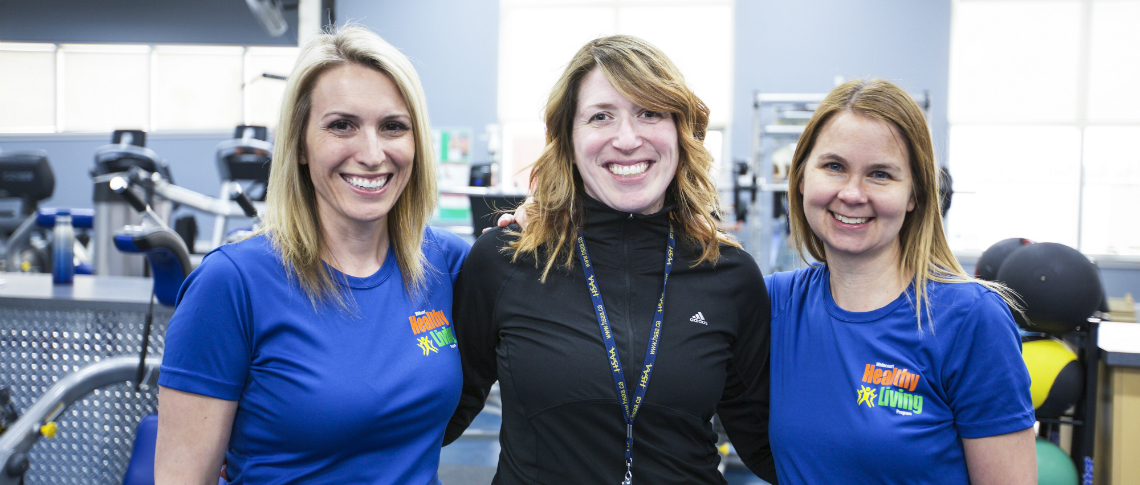
Physical activity is known to reduce the risk of chronic disease, help you lose weight and improve your balance, coordination, sleep habits and self-esteem. We spoke to Laureen Holloway, Lyndsay Perkins and Jessica Hein about their careers in physiotherapy and experience working with Whitecourt’s Healthy Living Program.
Can you tell me about the Healthy Living Program?
Lyndsay: We started developing the program in 2008 when we recognized there was a gap in the community for people with chronic conditions. They didn’t quite fit into outpatient physiotherapy services, yet they weren’t confident or able to come to the community fitness facility to exercise on their own. We developed this program as a team to try to bridge that gap and have people with chronic conditions exercise independently within the community.
Laureen: We try to improve the quality of life for people living with, or at risk of, chronic disease. This may include physical improvements in strength, flexibility and balance, gaining knowledge on a variety of health related topics and finding more emotional stability. We are really lucky in Whitecourt as there is a great partnership between AHS, the community and the primary care network.
What do you do on a day-to-day basis in your role?
Jessica: A typical day as a physiotherapist in a rural hospital could involve assessing if an acute client with an ankle injury is safe for discharge, treating a stroke client to improve her transfers and sitting balance, working with a 15 year old girl who had hand surgery to improve her range of motion and strength so she can return to dancing, conducting a group fall prevention exercise program at the local lodge, or teaching an exercise program to a diabetic client at our Healthy Living Program at the community fitness facility.
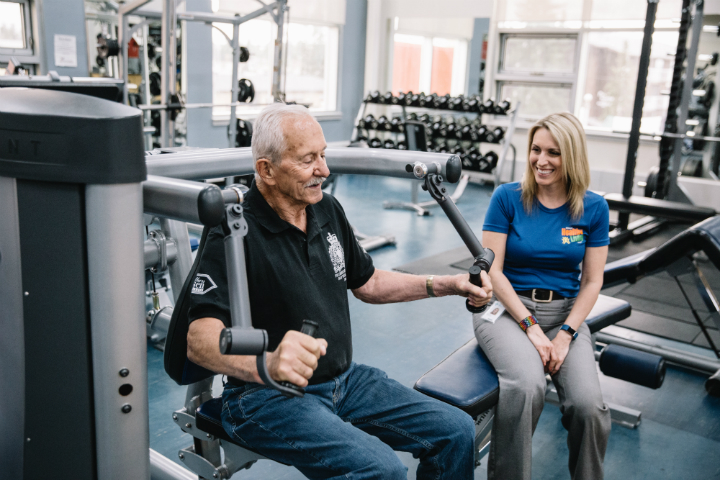
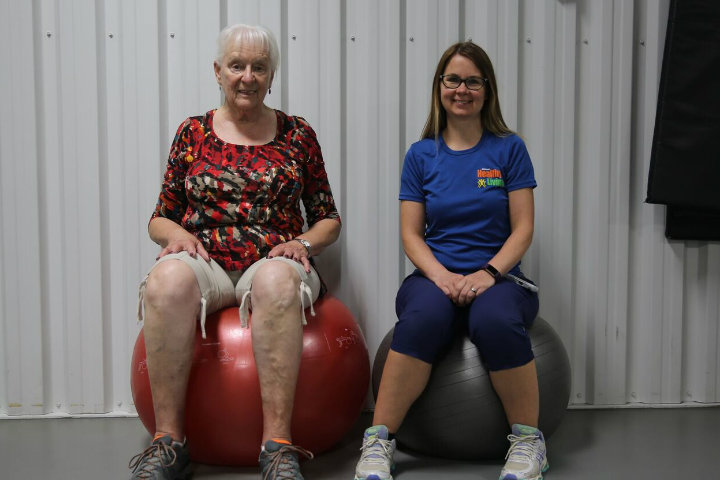
What do you love most about your job? And this program?
Jessica: I love the incredible feeling of assisting my clients to improve their function and reach their goals. I absolutely love our Whitecourt Healthy Living Program. I love how it is life changing for ourparticipants. Not only on a physical level, but also on a social and mental level as well. Many clients have told us it gives them a reason to leave the house during the day and has helped them overcome their anxiety and depression. A wonderful perk of the program is that participants receive a free six month membership when they graduate. It’s great to be working at the program and see so many of our graduates continue to exercise. It becomes their new habit!
Laureen: I enjoy the variety of clients — all ages and conditions. This keeps me learning and never bored! I love having the opportunity to help people to achieve their goals and improve the quality of their lives. The Healthy Living Program gives participants the skills and confidence they need to continue living a healthier life. What an amazing gift to be part of. It makes my heart sing when I see people continuing to exercise and live well long after the program has ended.
Lyndsay: It’s the fact we get to help people each day. When we do post-assessments for the participants and they see the improvements they’ve made either in their balance or endurance, I see the look of pride on their faces knowing they accomplished something.
What does working in a smaller community mean for you?
Jessica: I love the small community feeling at our hospital. You know everyone you work with. It creates a great environment when you have clients in the physiotherapy department who know each other and visit. I love raising my family in our smaller community. Whitecourt is a great place to live and has many events and program that are geared towards young families. I also love that it only takes five to ten minutes to get anywhere in town!
Lyndsay: It is never the same day to day. We are always seeing different conditions and different injuries. In my day, we also see different age groups, from pediatrics to geriatrics, and I love that mix. It keeps it exciting every day. I love Whitecourt as a community. It’s a great community to raise a family. There are a lot of programs for young families and kids.
Laureen: I enjoy the variety of conditions that we treat here at a rural hospital. I enjoy the sense of community that living in a town brings and how easy it is to get around. Less time commuting and more time with family and friends!
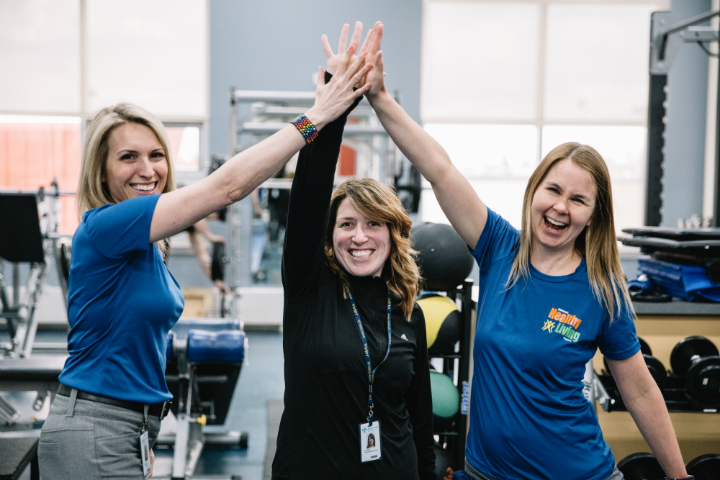
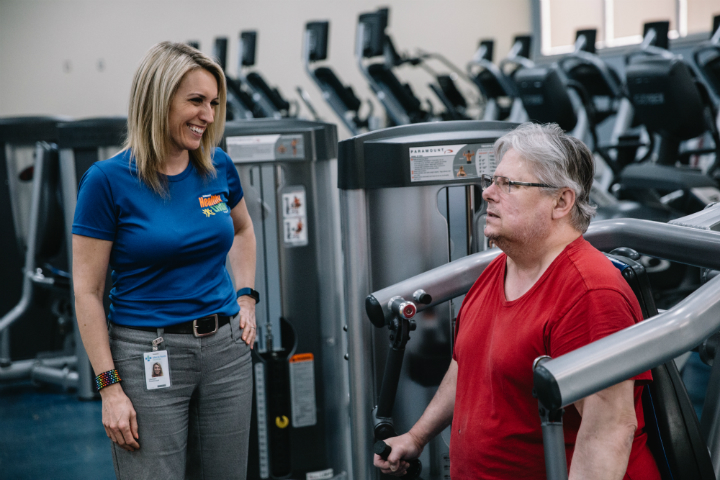
Why did you choose to work in health care? More specifically, physiotherapy?
Jessica: I choose to work in health care, specifically physiotherapy, because of my dad. He was diagnosed with multiple sclerosis when I was 15 and went to physiotherapy regularly. I fell in love with the profession when I saw how the physiotherapist was able to help improve his strength and ability to continue working on the farm.
Laureen: I started off my career as a schoolteacher and although I enjoyed it, I knew it wasn’t exactly what I wanted to do. Over the course of two years I spoke with anyone I could about why they chose their job, how they felt about it and why they continued doing it. I read thought-provoking books about discovering one’s purpose, and thought daily about what I would do in life if I didn’t “have to work.” What would combine many of the things I really enjoyed doing — teaching, helping and connecting with others, fitness, wellbeing and healing? I found it in physiotherapy! Every day I am grateful for being able to practice as physical therapist.
Do you have a patient story that has stuck with you?
Jessica: A patient was referred to the program for decreased mobility. The patient had developed back pain over a year ago and he was having difficulty even walking around his house. After the program which involved walking, balance exercises and gently strengthening, he reported that he was able to walk, for the first time in over a year, the two blocks to the local pub to enjoy wing night. He and his wife were absolutely thrilled!
Laureen: A few years ago I was moving and had some items for sale. A woman came to my door to purchase something from me and said, “You don’t remember me, do you?” When I admitted that I did not she said, “Well, I remember you.” She went on to tell me that she was the mother of a 12 year old boy I had treated years before, and how grateful they were to me for helping him regain the use of his hand. I now often think about how we don’t even realize the degree to which we have impacted someone and how much our profession can change a person’s life.